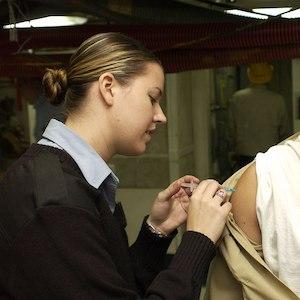I've been in science communication for over 8 years. If there's only one thing I learned, it's this: People don't respond to facts.
This has been the hardest thing for me to understand. I have a PhD in microbiology. I look at the world through a scientific lens. I have very few immovable beliefs; if the facts change, I change my mind. I try to make personal life decisions based on logic and reason rather than emotion. Apparently, most other people don't do stuff like that.
In fact, neuroscience suggests that we (and by "we," I mean people who think they're being logical and dispassionate) may be fooling our ourselves, anyway. A lot of our decision-making is rooted in emotion. People with brain damage that prevents them from feeling emotion have an extremely difficult time making decisions.
Whatever the cause, the reality is that the average human being is less like Spock and more like a whiny, rebellious teenager. So, how do we convince people to do important things, like getting a flu shot? It probably takes a tiny dose of facts combined with a heaping spoonful of emotion. And guilt is the best emotion.
An Emotional Appeal: Get the Flu Shot for Your Kids and Grandma
During the 2017-18 flu season, more than 79,000 Americans died. To put that number into perspective, there were about 47,000 suicides, 37,000 car crash fatalities, and 17,000 homicides in 2017. In other words, it was a really bad flu season. (Thankfully, not all flu seasons are that bad.)
There is a way to decrease the number of flu deaths. It's called the flu vaccine, and you can get one at places like Walgreens and Costco. But Americans have come up with a litany of excuses for getting the shot. "I never get the flu." (Wrong. About 49 million people got the flu during the last season.) "The flu isn't that bad." (Wrong. You're confusing the flu with a bad cold or food poisoning.) "The flu shot gave me the flu once." (No it didn't. Just stop.)
Because mythbusting isn't working, I'm going to try mixing facts with emotions. You should get the flu shot because influenza disproportionately harms little children and kills old people. Here are some stats about the 2017-18 flu season from the CDC:

The numbers are pretty striking. Children aged 0-4 years are more likely to be hospitalized than people aged 5 to 49 years (but are the least likely to die). And people aged 65 and older are way more likely to die than other age groups. The influenza mortality rate for the average adult (aged 18 to 49) is about 2.1 per 100,000 people, but the flu death rate for people aged 65+ is 134.6 per 100,000 people. That means an older person is 64 times more likely to die from the flu than a younger adult.
Now, the emotional appeal:
Do you want grandma to keep baking cookies? Well, she won't anymore if she dies from the flu. So go get your shot when the next flu season rolls around in October.




